Review: Paul Taylor American Modern Dance's All American Gala
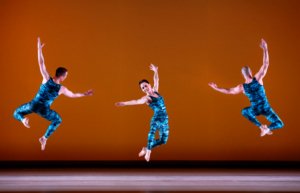
Paul B. Goode; photographer
With 4 African American dancers (five if you include Guest Artist, Misty Copeland) and one dancer of Asian descent Paul Taylor Dance Company finally looks like Paul Taylor AMERICAN Modern Dance. Under Michael Novak's artistic direction, with guidance from Bettie de Jong and John Tomlisnon, the company is smashing and primed to begin a new era while continuing to honour its forefather who passed away just over a year ago in August. The 65th season gala celebration included a few jewels and a new commission from one of dance's hottest choreographers.
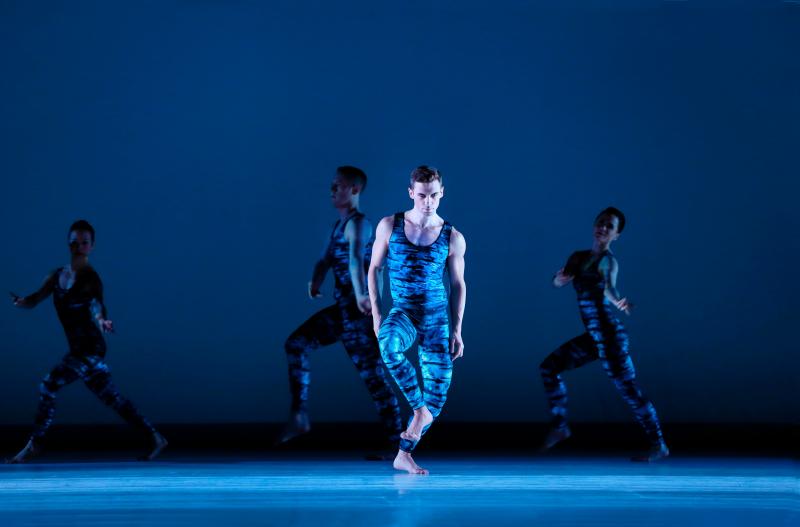
Paul B. Goode; photographer
Concertiana, the last ballet that Taylor choreographed opened the evening. All at once fresh and yet so simple in its elements, the ballet encapsulates everything the public knew about its choreographer and quite a few things that they didn't. What stood out most strikingly was how deeply immersed in classicism Taylor remained even in his final days. It is not inaccurate to write that in recent years the "Bad Boy of Modern Dance" was far from his structural best. In Concertiana he reversed that ebb and made base materials seem humanly resplendent: rhythmic crawling, floor skiing, whirling turns, a line of morphing shapes, and dashing solos that spoke of nothing less than the polar stars were mixed into a procession of progressive modernity.
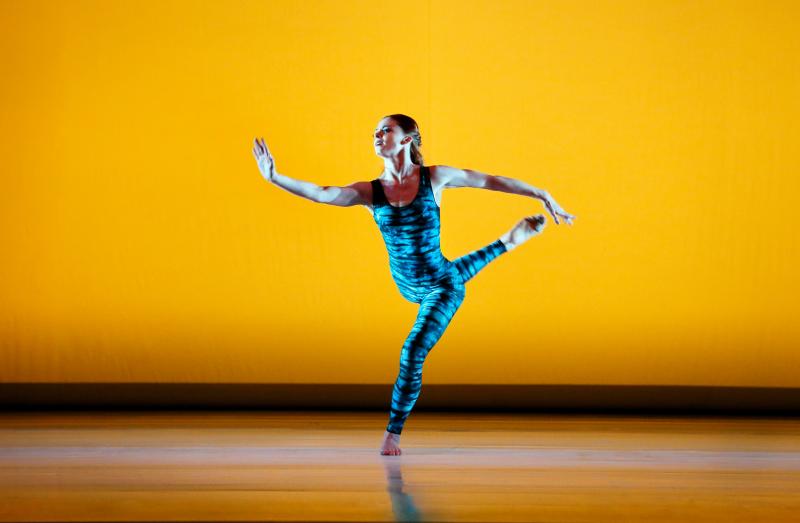
Paul B. Goode; photographer
While clearly composed by a man with much lived experience, the ballet felt startlingly new, as if Taylor had only just synthesized all that he'd learned in his fruitful life. For Michael Novak that meant a steady solo in the midst of many moving parts: dashing from side to side in low bearing jumps; slow-then-swift unwinding spirals that murmured, "constant vigilance but don't rush to conclusions"; and a masculine response to Martha Graham's floor strikes. Heather McGinley was transformed into a dowsing wand: running across the stage searching for an elusive treasure, only realizing as she lay down to rest that what she sought was her fellow dancers. And then there was Alex Clayton, for whom Taylor sculpted a stellar solo of deep musicality and lingering balances that hovered before knocking over into a new time signature, controlled by constantly modulating contractions. Like Taylor, Clayton got his start with the Graham Company--Graham II in the latter man's case--and retained the full articulation in alternating body parts that the technique demands. In keeping with Taylor's musical inclinations, Clayton used his body to layer complex rhythmic responsiveness on top of Eric Ewazen's lyrical score. If you are wondering what Taylor's final thoughts for the world were, look no further than Concertiana, particularly its solos.
Michael Trusnovec made a welcome guest appearance in the the solo from Episodes which we all know George Balanchine choreographed on Taylor as part of a collaboration with Martha Graham. Few dancers have performed this mysterious role; Trusnovec learned it from Jovani Furlan, who acquired it from the recently departed Peter Frame, for whom it was reconstructed and coached by the great man himself. Much has been lost in transmission as evidenced by this performance. Whereas the part calls for a Caliban, Trusnovec belonged to the air; Ariel. Technically he was flawless and as swathed in the Apollonian ideal as he was 15 years ago, to a fault. Listening to Webern's Variations, Op. 30, one heard chaos attempting to birth order but saw antiseptic perfection. Where was the creature clawing from the muck, striving for some semblance of humanity in this sun god's interpretation? Though Trusnovec was undoubtedly the perfect Taylor man, he lacked the strangeness that so defined the elusive loner. This was a worthy attempt, but I fear that without Taylor's coaching the Episodes solo is lost to the ages.
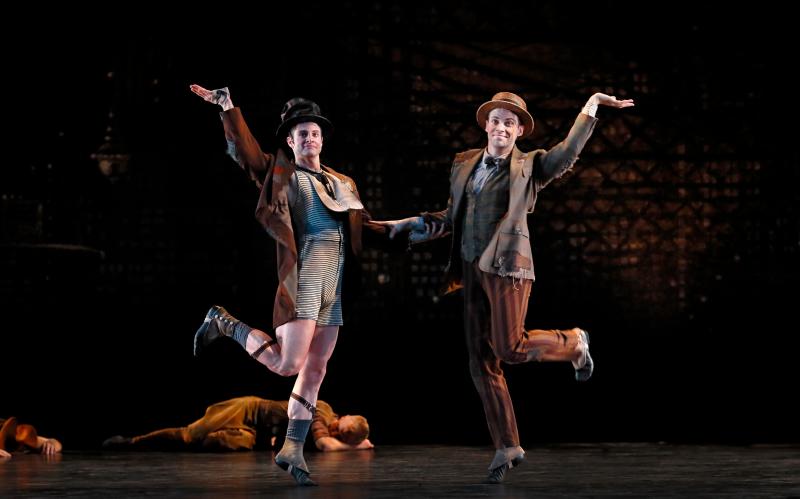
Paul B. Goode; photographer
Black Tuesday, with its set of songs from the Great Depression is always a welcome surprise, though perhaps the true delight was how well Misty Copeland acquitted herself among these surly swells. Perhaps it is to be expected; after all Black Tuesday is part of her repertoire at American Ballet Theatre just as Copeland is noted for the dramatic depth that she brings to her roles.
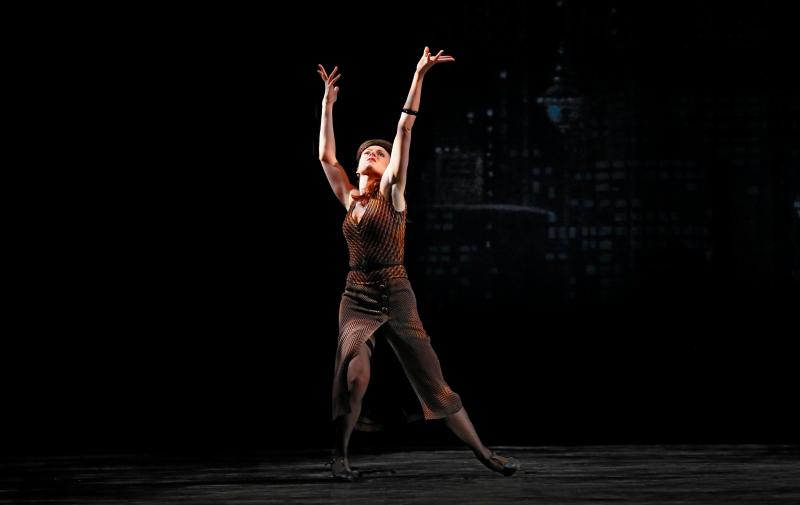
Paul B. Goode; photographer
Michael Apuzzo and Mr. Clayton led the bash as a jocular, near tap-dancing duo. Kristin Draucker kept the levity alive as a petulant pregnant trollop whose volley of high kicks all but exclaimed "Papa Won't You Dance With Me". Sean Mahoney embodied his rakish pimp with a music hall slink that made one wonder what Taylor might have been if he'd gone the Broadway route instead. Copeland broke away to rebel against her dejection on The Boulevard of Broken Dreams. Surely this is the loveliest moment in the ballet; it rejects humour and avoids sentimentality to paint a vivid account of luckless gumption raked against the whiles of marauding men. Copeland was defiant to the end, refusing to cave even after she was beaten. Jamie Rae Walker brought the house down as a murderous urchin with a buoyant jump that proved a lady can jump as high as any man. Of all the things that one can say about Black Tuesday, the most important is: go buy a ticket NOW before the November 2nd matinee and 7th evening performances sell out.
Kyle Abraham contributed a work of sparse movement that would not have looked out of place in the background of a Broadway jukebox musical set to the caramel silkiness of Shirley Horn's voice. Opening with Mr. Clayton and Eran Bugge waving their lindy-hopping tushies at the audience, the work moved on to a full "work-it" drag performance with an excellent bombshell turn from Lee Duveneck that thankfully declined to descend into gay bashing humour. Then Michelle Fleet slowly danced across the stage, facing upstage the entire time, beguiling all with her wavering back even though Dan Scully's dim lighting provided inadequate illumination for her beautiful skin.
It was at this point that one realized Abraham's minimal mood could not stand on its own merits. An adage in lento and simplicity is nothing to shake one's head at but when it lacks choreographic integrity and is entirely dependent upon brilliant music and performances to keep it afloat, one feels as if they are sitting through the stitching of an emperor's new silk purse. The seams unraveled when Devon Louis was saddled with movements that belonged to a different piece all together. The sudden change to liquid raver arms were incongruous but what caused Only The Lonely to fray was the sudden lack of cohesion or narrative that had carried its opening three movements. Good music can only do so much for a dance when movement is not wedded to its lustre.
Even saddled with this disjointed commission, the gala evening left all riding high with gleeful yearning for the programs to come. The dancers are fantastic, particularly the senior dancers who have never looked healthier, and Taylor's style is still intact. If you're wondering what to see in the coming weeks, Paul Taylor American Modern Dance is the obvious answer.
Paul Taylor American Modern Dance continues at The Koch Theater through November 17th, 2019 with a variety of excellent programs. For tickets or information, click HERE.
Reader Reviews

Videos
